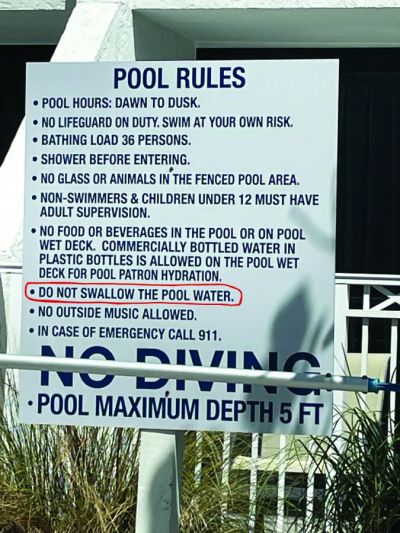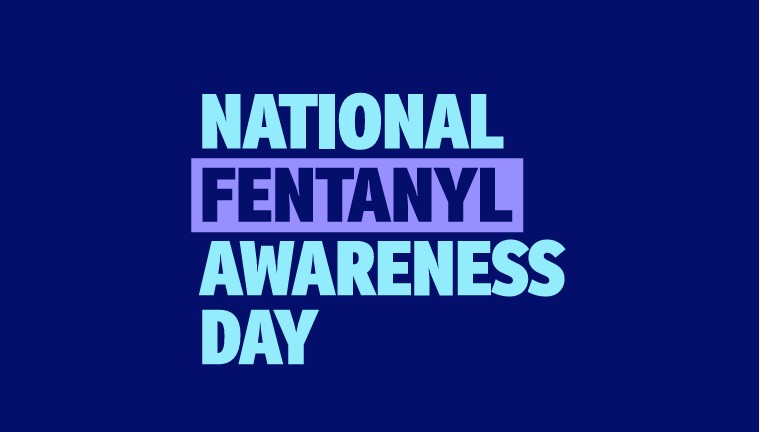Avoid the 8 typical mistakes made in newspaper operations
Chip Hutcheson
Jun 1, 2023


Some things in life are no-brainers — so why do we need rules to remind us of them?
Case in point is the sign on a resort swimming pool spotted on a recent trip to Florida (circled in the graphic). Anyone who has been in a public pool knows some of the things that happen in that pool. So common sense tells you not to drink the pool water!
There are many common sense aspects involved in a newspaper operation — yet there are times that written rules would come in handy because the obvious is being overlooked. Here are my top eight “do not” rules applied to newspaper operations.
1) IF YOU PROMISE READERS YOU WILL DO SOMETHING, DO NOT RENEGE ON THAT COMMITMENT
It is not uncommon for a paper to note that an event or activity may occur after deadline, but readers can find the information on the paper’s website. But that task can easily fall through the cracks and no timely post is made. In fact, it often necessitates a reader making a call or sending an email asking why it has not been posted. Whatever you promise to do, be sure to follow through.
2) DO NOT LEAVE MONEY ON THE TABLE
Face it — advertising dollars get harder to come by as locally owned businesses fade from the scene and competition mounts for ad dollars. Newspapers can offset some of that loss by focusing on ad projects that support community and school achievements. If the high school in your community has success in a sporting event/season, such as making it to the state tournament, sell ads that wish the team good luck and voice your support. Giving advertisers — many of them of the non-traditional variety — brings in revenue, but it builds good will in the community. These ads are attractive to civic organizations, churches, industries, education-related businesses and even individuals and parents.
When people and organizations in the community join together for a festival or charity event, promote it by offering advertisers the opportunity to encourage others to join in the effort.
Pay attention to special days of observance. During Future Farmers of America Week, solicit ads from banks, insurance agencies and agriculture-related businesses. There are special days and weeks set aside to honor doctors, nurses, educators and businesswomen — ad opportunities that can generate great reader interest and result in positive public relations for the paper. The result is the paper makes money while being a hero in the community.
3) DO NOT ABANDON YOUR EDITORIAL PAGE
That seems to be the trend, even in large metro papers. As the result of many papers making deep cuts in their editorial department, the editorial page is often the first page to vanish. That’s not healthy for the community, and it is not healthy for your bottom line. Find a way to have a local voice speaking to issues in the community. Find a local columnist — a retired person who will be willing to write about the community past and present. I’ve heard the argument that those people are hard to find. Not always. Look on Facebook, and you’ll likely find someone who has something worth saying, and your readers would benefit from it. I’ve heard complaints that no one writes letters to the editor any more. Part of the blame is that papers aren’t generating ideas that result in letters to the editor.
4) DO NOT BE CARELESS WITH HEADLINES
In my (Kentucky) neck of the woods, it seems like there’s been an epidemic of headline miscues. I’ve seen misspelled names in a headline — even though the spelling was correct in the story. Just as prevalent are grammatical errors — subject and verb not agreeing.
Certainly some of this problem is due to the proliferation of central design centers, where paginators are tasked with designing pages on tight production schedules. But readers don’t know, nor do they care, about the paginators’ challenges. They expect the basics — spelling and grammar — to be correct. And the readers are right!
5) THIS IS A NATURAL CONSEQUENCE OF FAILURE NO. 4
At the risk of sounding like an old fogey, do not kill reader interest by a poorly worded headline. My college journalism professors would be shouting angrily about headlines in some newspapers today.
For instance, we were taught never to end a deck in a headline with a preposition. Today, you might see someone’s first name on the end of a line, and the person’s last name on the next line. Major no-no. Occasionally, the headline will be two or three lines and include two sentences — with a period smack in the middle of the headline. To quote a current social media sensation, “I ain’t doin’ it.”
6) DO NOT MISS A SIGNIFICANT STORY BECAUSE YOU DIDN'T PAY ATTENTION TO YOUR PUBLIC NOTICES
Reading public notices should be required for all reporters. Those notices provide great tips — especially related to zoning and tax issues. Those notices can alert you to a new industry or business planning to locate in your community. If there is an issue related to water quality, a public notice could tip you off to it.
7) DO NOT DIMINISH A PHOTO’S IMPACT BY POOR (OR NO) CROPPING
I learned that lesson in college when I a photography instructor berated me for “ruining” three photos in the campus newspaper. But he was right, and it taught me the importance of judicious cropping. Far too often today, photos are imported into a template with nothing cropped out. That’s why you see a four-column photo that has two columns of content and the remainder is sky or grass or background that adds nothing to the photo.
8) DO NOT TURN OFF READERS BECAUSE OF A LAZY ‘LEDE’
OK, first of all, ‘lede’ is the correct spelling from the historical standpoint. “Lede” is a deliberate misspelling of “lead” to prevent confusion when printing was done with lead type (pre-offset era).
The lede’s purpose is to urge the reader to continue with the story. It seems that strong, compelling ledes are written too infrequently today. Too many city council or school board stories start with ledes that say the entity met and discussed … listing four or five issues but not giving emphasis to any of them. It’s far better to choose what is the most compelling issue and focus on it in the lede.
Even worse are some sports ledes. I’m convinced many today are written prior to a game being played. Too many stories start off by saying such things as, “School A and School B played Friday night.” That’s an insult to the reader. In small communities, most people know that, but the reporter has not provided any reason for the reader to continue.
Perhaps it’s the tighter deadline schedules that are necessary for large printing plants that have no flexibility in their schedules, and reporters write what they can ahead of time and fill in the blanks during competition. Whatever the reason, it’s not healthy to start a story by stating the obvious.
Take a few moments to examine your newspaper. Are there no-brainers that have crept into the operation that can easily be remedied?
Chip Hutcheson is the retired publisher of The Times Leader in Princeton, Kentucky. He was NNA president in 2015. He currently serves as a content strategist for Kentucky Today, the online news website of the Kentucky Baptist Convention. chiphutcheson@yahoo.com










